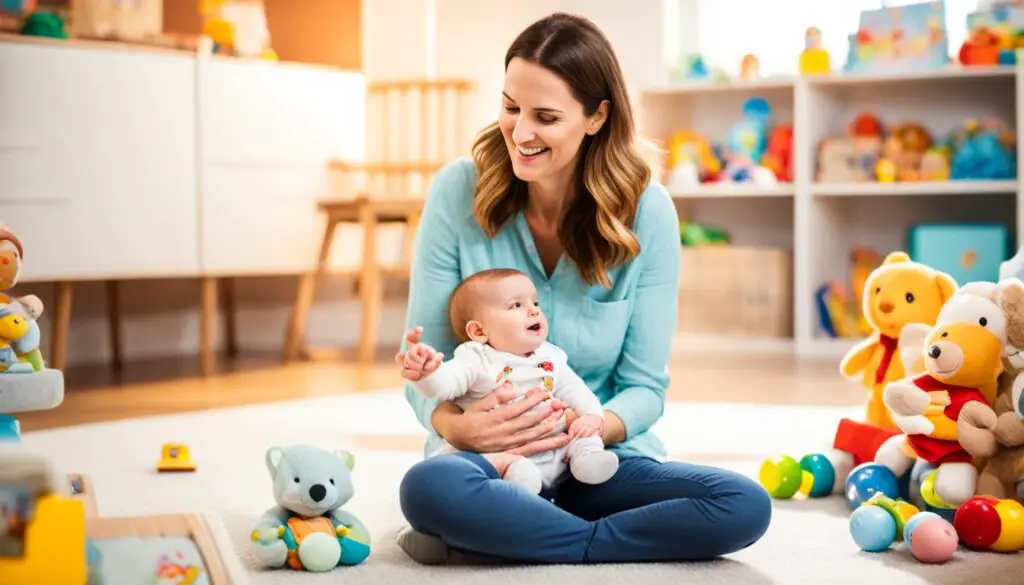
Enhancing Early Childhood Care: Approaches and Techniques
Early childhood care plays a vital role in the development and well-being of young children. By providing a nurturing and stimulating environment, we can foster their physical, cognitive, social, and emotional growth. Through research and evidence-based approaches, a range of techniques have been identified to enhance early childhood care and promote optimal development.
Key Takeaways:
- Early childhood care is crucial for fostering development in children.
- Responsive caregiving, early intervention programs, high-quality early education, and supportive family environments are key techniques to enhance early childhood care.
- Responsive caregiving involves building nurturing relationships and promoting secure attachment and healthy child-parent interactions.
- Early intervention programs provide support and intervention services to address developmental delays.
- High-quality early education and supportive family environments contribute to better outcomes in children.
Responsive Caregiving: A Key Component of Early Childhood Care
Responsive caregiving is an essential aspect of early childhood care that focuses on consistently meeting a child’s needs in a sensitive and timely manner. It involves building nurturing relationships between caregivers and children, fostering secure attachment and promoting healthy child-parent interactions. By paying close attention to cues and signals from the child, providing comfort and support, and engaging in positive and interactive activities, responsive caregiving plays a crucial role in a child’s development.
Studies have shown that responsive caregiving has a significant impact on various aspects of a child’s growth and well-being. Through nurturing and responsive interactions, children develop language skills, emotional regulation, and social competence. Additionally, responsive caregiving strengthens the child’s bond with their primary caregiver, contributing to a more secure attachment and positive child-parent relationship.
“Responsive caregiving involves being attuned to the child’s needs and providing appropriate support, creating a foundation for healthy development and lifelong well-being.”
During responsive caregiving, caregivers actively listen to the child, respond promptly and sensitively, and provide comfort and reassurance when needed. This helps children develop a sense of trust and security, which forms the basis for healthy relationships and emotional well-being throughout their lives.
Child-parent interaction is also a crucial component of responsive caregiving. By engaging in positive and interactive activities, such as playing, talking, and exploring the environment together, caregivers actively contribute to the child’s cognitive, social, and emotional development. These enriching experiences foster curiosity, creativity, and problem-solving skills, laying a strong foundation for future learning and growth.
Furthermore, nurturing relationships formed through responsive caregiving promote the child’s resilience and ability to cope with stress. When caregivers consistently respond to the child’s needs, they learn to regulate their emotions, develop coping strategies, and build a secure internal working model that helps them navigate challenges in life.
The Importance of Nurturing Relationships
Nurturing relationships created through responsive caregiving are essential for optimal child development. These relationships provide a supportive and caring environment where children feel safe, loved, and valued. Research indicates that nurturing relationships contribute to healthy brain development and enhance the child’s overall well-being.
The quality of child-parent attachment, which is fostered through responsive caregiving, has long-lasting effects on a child’s social, emotional, and cognitive outcomes. Secure attachment enables children to develop positive self-esteem, form healthy relationships with others, and regulate their emotions effectively.

Implementing responsive caregiving practices requires knowledge, empathy, and dedication. However, the positive impact it has on a child’s development makes it a vital component of early childhood care. By providing responsive caregiving, we create a nurturing and empowering environment that supports children in reaching their full potential.
Early Intervention Programs: Supporting Developmental Needs
Early intervention programs play a crucial role in addressing developmental delays and disabilities in young children. These programs provide essential intervention services and support to both children and their families, with the aim of promoting optimal development and minimizing the long-term impact of delays.
Early intervention professionals, including speech therapists, occupational therapists, and early childhood educators, collaborate closely with families to create individualized plans tailored to the specific developmental needs of each child. By working together, they can implement targeted strategies and interventions that address areas of concern and facilitate progress.
“Early intervention is critical in ensuring that children receive the support they need to thrive and reach their full potential. By identifying and addressing developmental delays early on, we can significantly improve outcomes for children and enhance their overall quality of life.”
Key Components of Early Intervention Programs
Early intervention programs provide a range of services and interventions to meet the unique needs of each child. These programs may include:
- Developmental assessments and screenings to identify areas of concern.
- Speech and language therapy to enhance communication skills.
- Occupational therapy to support fine motor skills and daily living activities.
- Physical therapy to improve gross motor skills and coordination.
- Behavioral therapy to address social-emotional development and behavior challenges.
- Parent education and support to enable families to actively participate in their child’s progress.
Early intervention programs are delivered through a multidisciplinary approach, bringing together professionals from various disciplines to provide comprehensive support. This collaborative effort ensures that children receive holistic care that addresses their diverse needs.
| Benefits of Early Intervention Programs | Research Findings |
|---|---|
| Improved cognitive skills | Studies have shown that children who receive early intervention services demonstrate significant improvements in cognitive abilities, such as problem-solving, memory, and attention. |
| Enhanced language development | Early intervention can have a positive impact on a child’s language skills, including vocabulary development, expressive language, and receptive language abilities. |
| Promotion of social-emotional functioning | By addressing social-emotional development through early intervention, children can develop vital skills such as emotional regulation, social interaction, and empathy. |
These findings highlight the significant positive impact that early intervention programs can have on a child’s overall development. By providing timely and targeted support, these programs empower children to thrive and overcome developmental challenges.

High-Quality Early Education and Supportive Family Environments
High-quality early education programs are integral in providing young children with a solid foundation for their future. These programs offer a stimulating and enriching environment that fosters the development of cognitive, language, and social skills. Play-based learning, individualized instruction, and positive teacher-child interactions are emphasized to ensure that every child’s unique needs and abilities are met.
However, the impact of early education is further amplified when families are actively involved in their child’s learning journey. When families are involved, children experience a seamless connection between their home and educational environments, creating a synergy that enhances their overall development. By involving families, we are able to create supportive home environments that nurture children’s growth and facilitate their holistic development.
Parent education programs and resources are crucial in equipping parents with the knowledge and skills to effectively support their child’s development at home. These programs offer valuable insights into child development, guidance on fostering positive parent-child interactions, and strategies to promote a supportive and nurturing home environment. By empowering parents with this education, we enable them to become active partners in their child’s educational journey, creating a strong foundation for their future success.
Research consistently demonstrates that high-quality early education and supportive family environments significantly contribute to better academic outcomes, improved social-emotional skills, and overall well-being in young children. By providing children with a solid educational foundation and creating a supportive home environment, we are setting them on a path to thrive both academically and personally.
FAQ
What is early childhood care?
Early childhood care involves providing a nurturing and stimulating environment that supports the physical, cognitive, social, and emotional growth of young children.
What is responsive caregiving?
Responsive caregiving refers to consistently meeting a child’s needs in a sensitive and timely manner, building nurturing relationships between caregivers and children.
How does responsive caregiving impact a child’s development?
Responsive caregiving significantly impacts a child’s development, including their language skills, emotional regulation, and social competence.
What are early intervention programs?
Early intervention programs are designed to identify and address developmental delays and disabilities in young children, providing intervention services and support.
What professionals are involved in early intervention programs?
Early intervention professionals, such as speech therapists, occupational therapists, and early childhood educators, work collaboratively with families to create individualized plans.
How do early intervention programs benefit children?
Early intervention programs can have a significant positive impact on a child’s outcomes, including improved cognitive skills, language development, and social-emotional functioning.
What is high-quality early education?
High-quality early education provides a stimulating and enriching environment that promotes children’s cognitive, language, and social skills.
How can supportive family environments enhance early childhood care?
Involving families in their child’s education and creating supportive home environments can enhance early childhood care, contributing to better academic outcomes and overall well-being.
What are parent education programs?
Parent education programs provide parents with knowledge and skills to support their child’s development and create nurturing and responsive interactions at home.